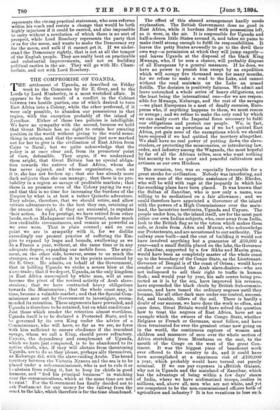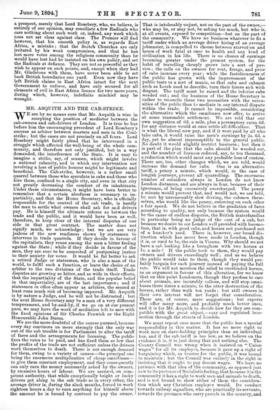THE COMPROMISE ON UGANDA. T HE settlement of Uganda, as described
on Friday week to the Commons by Sir E. Grey, and to the Lords by Lord Kimberley, is a most wretched affair. It appears to be the result of a conflict in the Cabinet between two hostile parties, one of which desired to turn East Africa into a Colony, while the other preferred, if it were only possible, to abandon our possessions in that region, with the exception probably of the island of Zanzibar. Either of those two policies is intelligible. We have no sympathy with the second, because we hold that Great Britain has no right to retain her amazing position in the world without giving to the world some- thing in return, and that the something just now marked out for her to give is the civilisation of East Africa from Cairo to Natal ; but we quite acknowledge that the policy is at once clear and, from its promoters' point of view, defensible. They argue, if we understand them aright, that Great Britain has no special obliga- tion towards the natives of East Africa, whom she bas never injured, and whose organisation, such as it is, she has not broken up ; that she has already more -dark subjects than she can manage ; that there is no pro- bability in a region so savage of profitable markets ; that -there is no promise even of the Colony paying its way ; and that this is no time for increasing the burdens of the Empire by what is at best a rather Quixotic adventure.
• They advise, therefore, that we should retire, and allow private adventurers to do the best they can, retaining at the utmost the right, if they are successful, to regulate their action. As for prestige, we have retired from other lands, such as Madagascar and the Transvaal, under much less creditable circumstances, and remain as powerful as we ever were. That is plain counsel; and on one -point we are in sympathy with it, for we dislike • exceedingly our present practice of suffering the Em- pire to expand by leaps and bounds, swallowing as we do a France a year, without, at the same time or in any -adequate degree, expanding our mobile force. The argu- ment, on the other side, however, seems to us much the stronger, even if we confine it to the points mentioned by Sir E. Grey. He admits, on behalf of the Government, that in holding Uganda we strike a severe blow at the slave-trade; that if we depart, Uganda, as the only kingdom in East Africa unoccupied by white men, will at once become the pivot of the revived activity of Arab slave- stealers ; that we have contracted heavy obligations towards the Missionaries ; that the whole coast may, in time, become a valuable market ; and that the Special Com- missioner sent out by Government to investigate, recom- mended its retention. These arguments have prevailed, and Uganda is therefore to be retained, but on what conditions '? Just those which render the retention almost worthless. Uganda itself is to be declared a Protected State, and to be governed by its own King under the advice of a 'Commissioner, who will have, so far as we see, no force with him sufficient to ensure obedience if the truculent savage, whom we call a King, should prove refractory.
U nyoro, the dependency and complement of Uganda, which we have just conquered, is to be abandoned to its native chiefs, who, if they will abstain from threatening Uganda, are to do as they please, perhaps ally themselves, as Kabarega did, with the slave-raiding Arabs. The broad territory between the Victoria Nyanza and the sea is to be placed under a sub-commissioner, who is not to rule it or to abstain from ruling it, but to keep its chiefs in good humour, and "find his principal business" in watching over the communications, which at the same time are not t3 exist ! For the Government has finally decided not to ask Parliampnt for any money for the railway from the coast to the lake, which therefore is for the time abandoned. The effect of this absurd arrangement hardly needs explanation. The British Government does no good in East Africa, while it burdens itself with possessions left, as it were, in the air. It is responsible for Uganda and half-a-dozen little States around it, and takes no pains to make itself strong enough to fulfil its responsibilities. It leaves the petty States avowedly to go to the devil their own way—a permission at which they will jump eager1y-7- and leaves Uganda at the disposal of the black King Mwanga, who, if he sees a chance, will probably dispose of all Europeans by a general massacre. If he does, we have no power to punish him except by an expedition which will occupy five thousand men for many months, for we refuse to make a road to the Lake, and cannot without the road maintain on the Lake an armed flotilla. The decision is positively fatuous. We admit and leave untouched a whole series of heavy obligations, not the least being the international one—for we are respon- sible for Mwanga, Kabarega, and the rest of the savages —we plant Europeans in a nest of deadly enemies, Euro- peans who, if anything happens to them, we must rescue or avenge ; and we refuse to make the only road by which we can easily exert the Imperial force necessary to fulfil our obligations and protect our people. We, in fact, render ourselves as powerless as if we had quitted East Africa, yet gain none of the exemptions which we should have enjoyed if we had quitted the territory altogether. We shall have no real power of putting down the slave- stealers, or protecting the missionaries, or introducing law, order, and industry among the Waganda, the most hopeful by far of all the African tribes, men who want nothing but security to be as quiet and peaceful cultivators and artisans as our own Hindoos.
The occasion, too, was so especially favourable for a great stroke for civilisation. Nobody was interfering, and we were sure of the energetic assistance of Mr. Rhodes, who will be wild with rage at the jeopardy in which his far-reaching plans have been placed. It was known that the Sultan of Zanzibar, who is now only a name, was willing to be mediatised on a fair allowance ; and we could therefore have appointed a Governor of the island with the powers of a High Commissioner over the main- land, the lacustrine territories, Uganda and Unyoro. The people under him, in the island itself, are for the most part either our own Indian subjects, who, once away from India, look to the British flag as to the totem which makes them safe. or Arabs from Aden and Muscat, who acknowledge our Protectorate, and are accustomed to our authority. The railway once built—and the cost of building it would not have involved anything but a guarantee of 250,000 a year—and a small flotilla placed on the lake, the Governor of Zanzibar, supported by a, few Sikhs and Maxim guns, would have been as completely master of the whole coast up to the boundary of the Congo State, as the Lieutenant- Governor of Bengal is of the coast of Orissa ; would have crushed or conciliated the Arab slave-dealers—who are not indisposed to sell their right to traffic in human flesh ; and would year by year, his safe centre being pro- tected as it is by the sea, have improved his revenue, have superseded the black chiefs by British Sub-commis- sioners, and have tamed the ordinary negroes until they became, like all other dark men under, our control, success- ful, and taxable, tillers of the soil. There is hardly a doubt of our success, we have done the work so often, and once done, Great Britain would have solved the question how to treat the negroes of East Africa, have set an example which the owners of the Congo State, whether Belgians or French or Germans, must follow, and have thus terminated for ever the greatest crime now going on in the world, the continuous capture of women and children and massacre of men over the whole section of Africa stretching from Mombassa on the east, to the mouth of the Congo on the west of the great Con- tinent. It was the biggest piece of beneficent work ever offered to this country to do, and it could have been accomplished at a maximum risk of 2100,000 a year, which probably would have turned out purely nominal. If we can pay expenses in British Guiana, why not in Uganda and the mainland of Zanzibar, which has the advantage of being within a few days' steam of India, where we have acclimatised troops, coolies in millions, and, above all, men. who are not white, and yet are competent to be the non-commissioned officers both of agriculture and industry ? It is too vexatious to lose su3h a prospect, merely that Lord Rosebery, who, we believe, is entirely of our opinion, may conciliate a few Radicals who care nothing about such work or, indeed, any work which does not set class against class. The Premier will find however, that his smooth policy is, as regards East Africa, a mistake ; that the Scotch Churches are only irritated by his weak compromises, and that he has lost more votes among the religious community than he would have lost had he insisted on his own policy, and set the Radicals at defiance. They are not so powerful as they wish to appear on such points, and, except when they had Mr. Gladstone with them, have never been able to set back British boundaries one yard. Even now they have left British claims in East Africa intact for the next Government to enforce, and have only secured for all elements of evil in East Africa licence for two more years, during which, however, indefinite mischief may be wrought.







































 Previous page
Previous page